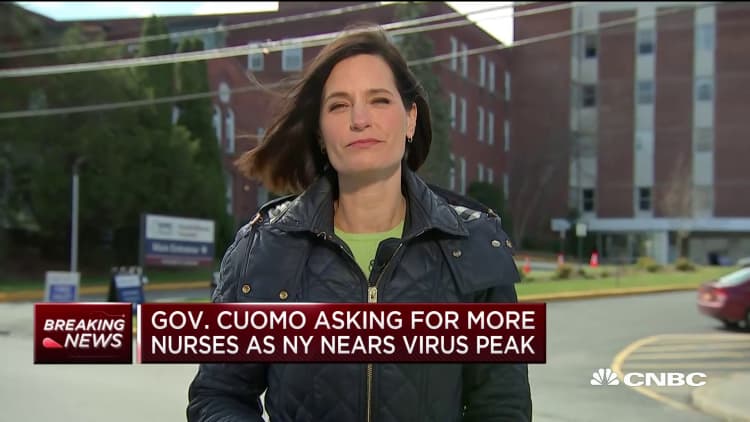
Karen Fountain is no stranger to crisis situations. As a traveling nurse, she's cared for patients during dangerous times, including the Ebola outbreak in 2014.
"That's what we're made for. We can walk in and start working in a day, two days. We don't need the full six months orientation. We can hit the floor running, and I think that's what makes us special, unique and able to assist," she said.
Those specialized skills have never been more in demand.
Across the country, the coronavirus pandemic is straining hospital systems, which are dealing with an influx of patients. State and health officials are responding by adding beds, canceling elective surgeries and reassigning staff. But more help is needed — especially more nurses.
New York Gov. Andrew Cuomo has been pleading for health-care workers to come to the state, which leads the nation in confirmed cases, with over 92,381 reported as of Thursday.
Ulster County Executive Patrick Ryan said the county, located 75 miles from New York City, has added 235 beds at the St. Mary's Avenue campus of HealthAlliance in Kingston and has commitments from two other local hospitals to double their capacity. Now, the county needs more medical workers to handle the increase.
"Looking at the numbers, we knew we need to quadruple our hospital beds and of course the staff to go with it," Ryan said. "We are concerned about having enough doctors, nurses and medical staff on the front lines."
As demand spikes, staffing agencies are offering unprecedented incentives for nurses willing to enter hot zones. NuWest staffing agency is paying those hired up to $10,000 a week in crisis pay. It's also offering relocation bonuses and tax-free housing and food.
Fastaff, based in Denver, specializes in sending nurses to places hit by natural disasters, such as hurricanes, floods and tornadoes. It typically pays above market rates for staff, but Chief Executive Bart Valdez said the demand is so great that the company is increasing pay even further.
"Typically, when we're fulfilling for a crisis, there's three or four hot spots around the country that we're focused on," he said. "Since this is so widespread, there's a great deal more competition for these nurses."
Today's crisis comes at a time when the labor market for nurses was already tight, he added.
Even before the outbreak of COVID-19, the United States was facing a nursing shortage brought on by an aging population and aging workforce of nurses. According to the U.S. Bureau of Labor Statistics, the health-care system will need to hire more than 1.1 million nurses by 2022 in order to replace retirees and to take care of an aging population.
For nurses willing to answer the call now, the higher pay comes with higher risks. Fountain has been in quarantine for two weeks after being exposed to the virus while working at a hospital in the Bronx.
She plans to be back on shift this week, but said it's not the money that is motivating her to return to the front lines.
"I'm a little apprehensive of going back just because I know how bad it's gotten since I went into quarantine," she said. "I have to go back. There's no way not to. It's my duty. It's my job. I'm a nurse."
CNBC's Contessa Brewer and Jessica Golden contributed to this report.


